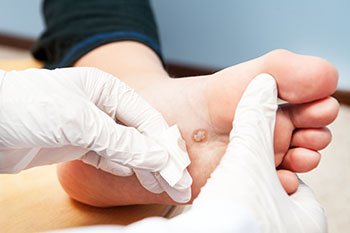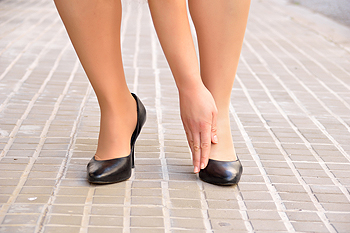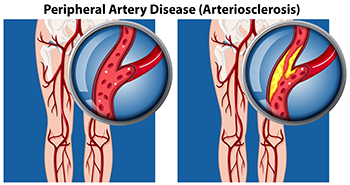Connect With Us
Blog
Items filtered by date: September 2021
Painful, Persistent Plantar Warts
Warts are growths on the skin caused by the human papillomavirus (HPV). They can occur in various areas of the body and are spread through direct contact or indirectly through contact with a surface or object that has previously been in contact with a wart. Plantar warts are flat, hard, and rough growths that develop on the bottom surface (plantar) of the foot. They are brown or gray, with tiny black dots in the center, which are actually blood vessels that nourish the wart with oxygen and nutrients. Plantar warts can be individual or grow in clusters. They are typically tender and can be quite painful while walking and standing. While they may go away on their own, it can take years to completely rid yourself of them. If you have one or more plantar warts that are causing you discomfort, contact a podiatrist who has a variety of treatment options to remove the wart.
Plantar warts can be very uncomfortable. If you need your feet checked, contact one of our podiatrists from Family Foot and Ankle Care of Moriches. Our doctors will assist you with all of your foot and ankle needs.
About Plantar Warts
Plantar warts are the result of HPV, or human papillomavirus, getting into open wounds on the feet. They are mostly found on the heels or balls of the feet.
While plantar warts are generally harmless, those experiencing excessive pain or those suffering from diabetes or a compromised immune system require immediate medical care. Plantar warts are easily diagnosed, usually through scraping off a bit of rough skin or by getting a biopsy.
Symptoms
- Lesions on the bottom of your feet, usually rough and grainy
- Hard or thick callused spots
- Wart seeds, which are small clotted blood vessels that look like little black spots
- Pain, discomfort, or tenderness of your feet when walking or standing
Treatment
- Freezing
- Electric tool removal
- Laser Treatment
- Topical Creams (prescription only)
- Over-the-counter medications
To help prevent developing plantar warts, avoid walking barefoot over abrasive surfaces that can cause cuts or wounds for HPV to get into. Avoiding direct contact with other warts, as well as not picking or rubbing existing warts, can help prevent the further spread of plantar warts. However, if you think you have developed plantar warts, speak to your podiatrist. He or she can diagnose the warts on your feet and recommend the appropriate treatment options.
If you have any questions please feel free to contact our offices located in Moriches and Shirley, NY . We offer the newest diagnostic and treatment technologies for all your foot and ankle needs.
What to Avoid When It Comes to High Heels
High heeled shoes may be fashionable, but they are not your best footwear option when it comes to maintaining the proper health of your feet. Wearing high heels, particularly shoes that are tight-fitting, narrow, or have excessively high heels, can damage your feet. Frequent high heel wearing can lead to bunions, hammertoes, pump bump, corns, calluses, neuromas, ankle sprains, and even back pain. If you would still like to wear high heels, reduce the risk of potential problems by opting for shoes that do not have pointed or narrow toe boxes, or a heel taller than two inches. If you start to feel foot pain while wearing these shoes, it is suggested that you change into something more comfortable and properly fitting as soon as possible. For more information about the effects of high heels on the feet, please consult with a podiatrist.
High heels have a history of causing foot and ankle problems. If you have any concerns about your feet or ankles, contact one of our podiatrists from Family Foot and Ankle Care of Moriches. Our doctors can provide the care you need to keep you pain-free and on your feet.
Effects of High Heels on the Feet
High heels are popular shoes among women because of their many styles and societal appeal. Despite this, high heels can still cause many health problems if worn too frequently.
Which Parts of My Body Will Be Affected by High Heels?
- Ankle Joints
- Achilles Tendon – May shorten and stiffen with prolonged wear
- Balls of the Feet
- Knees – Heels cause the knees to bend constantly, creating stress on them
- Back – They decrease the spine’s ability to absorb shock, which may lead to back pain. The vertebrae of the lower back may compress.
What Kinds of Foot Problems Can Develop from Wearing High Heels?
- Corns
- Calluses
- Hammertoe
- Bunions
- Morton’s Neuroma
- Plantar Fasciitis
How Can I Still Wear High Heels and Maintain Foot Health?
If you want to wear high heeled shoes, make sure that you are not wearing them every day, as this will help prevent long term physical problems. Try wearing thicker heels as opposed to stilettos to distribute weight more evenly across the feet. Always make sure you are wearing the proper shoes for the right occasion, such as sneakers for exercising. If you walk to work, try carrying your heels with you and changing into them once you arrive at work. Adding inserts to your heels can help cushion your feet and absorb shock. Full foot inserts or metatarsal pads are available.
If you have any questions please feel free to contact our offices located in Moriches and Shirley, NY . We offer the newest diagnostic and treatment technologies for all your foot and ankle needs.
Risk Factors for Gout
Gout is a type of arthritis that is caused by excess uric acid in the bloodstream crystallizing and lodging in the joints. It frequently affects the joints of the big toes, which causes sudden and intense pain, swelling, redness, warmth, and stiffness. Certain people are more at risk of developing gout than others. People who have medical conditions such as diabetes, kidney disease, high blood pressure, high cholesterol, and osteoarthritis should be vigilant of any gout symptoms. Gout is also associated with obesity and with diets high in purines, which are found in seafood and red meat. Certain medications can increase uric acid levels in the body, which may lead to gout. Men are more likely to develop gout prior to the age of 60, while both men and women aged 60 and over have an equal risk of developing gout. Finally, gout may be more likely in people with a family history of this condition. If you have gout or are at risk for it, please consult with a podiatrist, who can help you get the right treatments and teach you strategies to prevent gout.
Gout is a foot condition that requires certain treatment and care. If you are seeking treatment, contact one of our podiatrists from Family Foot and Ankle Care of Moriches. Our doctors will treat your foot and ankle needs.
What Is Gout?
Gout is a type of arthritis caused by a buildup of uric acid in the bloodstream. It often develops in the foot, especially the big toe area, although it can manifest in other parts of the body as well. Gout can make walking and standing very painful and is especially common in diabetics and the obese.
People typically get gout because of a poor diet. Genetic predisposition is also a factor. The children of parents who have had gout frequently have a chance of developing it themselves.
Gout can easily be identified by redness and inflammation of the big toe and the surrounding areas of the foot. Other symptoms include extreme fatigue, joint pain, and running high fevers. Sometimes corticosteroid drugs can be prescribed to treat gout, but the best way to combat this disease is to get more exercise and eat a better diet.
If you have any questions please feel free to contact our offices located in Moriches and Shirley, NY . We offer the newest diagnostic and treatment technologies for all your foot and ankle needs.
PAD Symptoms and Risk Factors
Peripheral artery disease (PAD) is a condition characterized by poor circulation in the lower limbs. It occurs when the arteries that transport blood in the lower limbs become narrow and hardened due to a buildup of plaque. In its earlier stages, PAD is often asymptomatic. As it progresses, symptoms can begin to appear and may include leg cramping, numbness, weakness, coldness, discoloration, hair loss, changes in the texture and color of toenails, and the formation of poorly healing wounds on the feet and ankles. Since symptoms might not arise until the disease has progressed significantly, screening for PAD is very important. People who are at risk for PAD, such as adults over the age of 50, those who live a sedentary lifestyle, and those who have a history of diabetes, high blood pressure, high cholesterol, or cardiovascular problems, should speak with a podiatrist about getting tested for PAD.
Peripheral artery disease can pose a serious risk to your health. It can increase the risk of stroke and heart attack. If you have symptoms of peripheral artery disease, consult with one of our podiatrists from Family Foot and Ankle Care of Moriches. Our doctors will assess your condition and provide you with quality foot and ankle treatment.
Peripheral artery disease (PAD) is when arteries are constricted due to plaque (fatty deposits) build-up. This results in less blood flow to the legs and other extremities. The main cause of PAD is atherosclerosis, in which plaque builds up in the arteries.
Symptoms
Symptoms of PAD include:
- Claudication (leg pain from walking)
- Numbness in legs
- Decrease in growth of leg hair and toenails
- Paleness of the skin
- Erectile dysfunction
- Sores and wounds on legs and feet that won’t heal
- Coldness in one leg
It is important to note that a majority of individuals never show any symptoms of PAD.
Diagnosis
While PAD occurs in the legs and arteries, Podiatrists can diagnose PAD. Podiatrists utilize a test called an ankle-brachial index (ABI). An ABI test compares blood pressure in your arm to you ankle to see if any abnormality occurs. Ultrasound and imaging devices may also be used.
Treatment
Fortunately, lifestyle changes such as maintaining a healthy diet, exercising, managing cholesterol and blood sugar levels, and quitting smoking, can all treat PAD. Medications that prevent clots from occurring can be prescribed. Finally, in some cases, surgery may be recommended.
If you have any questions, please feel free to contact our offices located in Moriches and Shirley, NY . We offer the newest diagnostic and treatment technologies for all your foot care needs.
Why Live with Pain and Numbness in Your Feet?
Blog Archives
- April 2025
- March 2025
- February 2025
- January 2025
- December 2024
- November 2024
- October 2024
- September 2024
- August 2024
- July 2024
- June 2024
- May 2024
- April 2024
- March 2024
- February 2024
- January 2024
- December 2023
- November 2023
- October 2023
- September 2023
- August 2023
- July 2023
- June 2023
- May 2023
- April 2023
- March 2023
- February 2023
- January 2023
- December 2022
- November 2022
- October 2022
- September 2022
- August 2022
- July 2022
- June 2022
- May 2022
- April 2022
- March 2022
- February 2022
- January 2022
- December 2021
- November 2021
- October 2021
- September 2021
- August 2021
- July 2021
- June 2021
- May 2021
- April 2021
- March 2021
- February 2021
- January 2021
- December 2020
- November 2020
- October 2020
- September 2020
- August 2020
- July 2020
- June 2020
- May 2020
- April 2020
- March 2020
- February 2020
- January 2020
- December 2019
- November 2019
- October 2019
- September 2019
- August 2019
- July 2019
- June 2019
- May 2019
- April 2019
- March 2019
- February 2019
- January 2019
- December 2018
- November 2018
- October 2018
- September 2018
- August 2018
- July 2018
- June 2018
- May 2018
- April 2018
- March 2018
- February 2018
- January 2018
- December 2017
- November 2017
- October 2017
- September 2017
- August 2017
- July 2017
- June 2017
- May 2017
- April 2017
- March 2017
- February 2017
- January 2017
- December 2016
- November 2016
- October 2016
- September 2016
- August 2016
- July 2016
- June 2016
- October 2015
- September 2015
- August 2015
- July 2015
- June 2015
- May 2015
- April 2015








